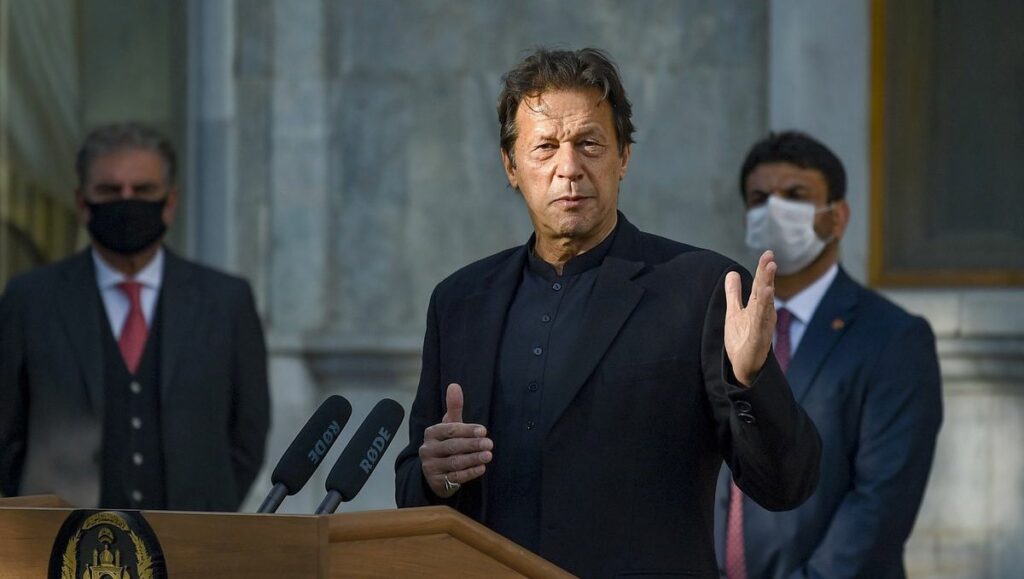
For those of a certain generation, Imran Khan’s name will forever be synonymous with matchless swing bowling and the cornered-tigers captaincy that led Pakistan to World Cup glory in 1992. Long before he was removed as Prime Minister and then sent to jail, Imran’s politics had invited scepticism. If his cricket was all about authenticity, then his politics led to many accusations of opportunism and doing things on the fly.
But this is not about Imran the political leader or demagogue. It’s about the finest cricketer of his generation and the best all-rounder the game has seen after the peerless Sir Garfield Sobers. It’s now so long since Imran retired that those that never watched him play would struggle to imagine that there could have been such a player.
Just consider one set of numbers. Imran captained Pakistan in 48 of the 88 Tests he played. In those matches, he scored five Test hundreds while averaging 52.34, and took 187 wickets at 20.26. Those aren’t just elite numbers, they’re all-time-great ones – with bat and ball. For all the comparisons with the other great all-rounders of the age, Imran was the only one good enough to bat in the top order and take the new ball. People go ga-ga over Ben Stokes, with good reason. It’s just enough to say here that Imran was better.
Along with Viv Richards, he was also the most charismatic cricketer of his age. When Imran walked into a room, conversation stopped. With a voice as deep as Tom Jones, and increasingly aware of the power of his words, Imran knew most folks were moths around a flame once he started holding court. His critics called him ‘Im the Dim’ and other cruel names, but even as he aged, the magnetic field around him never weakened.
Also Read: Imran Khan Given 10-Year Prison Term
Javed Miandad and he didn’t always see eye to eye. How could they, the Karachi street fighter and the Oxbridge patrician? But even Miandad would never downplay Imran’s role in Pakistan cricket’s glory years. As for others that played under him, they swear by him. Listen to Wasim Akram talk even today, nearly 40 years after they first played together, and the admiration is undiluted.
In those days before the concept of neutral umpires – Imran was one of its first champions – tours to Pakistan were never complete without an umpiring controversy or three. Long before Mike Gatting and Shakoor Rana, India had conceded an ODI in Sialkot after the umpires refused to do a thing about bouncers sailing miles over the batsmen’s heads.
In 1982-83, despite heroics from Mohinder Amarnath and Sunil Gavaskar, India were thumped 3-0 in a six-Test series across the border. That effectively ended Gundappa Viswanath’s career, after Imran dismissed him for 1 (Lahore), 0 (Karachi) and 0 (Hyderabad, Sind). Imran’s boomerang inswingers and mastery of the old ball fetched him 40 wickets, even as complaints persisted about the home-town umpiring.
The late Rajan Bala was one of the Indian journalists on that tour. “The umpiring was diabolical,” he told a small group of reporters decades later. After a pause, he added this: “But don’t use that as an excuse. Imran was so good he could have bowled us out with an orange.”
The story of the 1987 World Cup semifinal doesn’t need to be retold. Craig McDermott’s 5-44 in Lahore had shattered Pakistan’s dreams of winning the World Cup in front of a packed Eden Gardens. At 35, time looked up for Imran. Even he thought as much. He retreated to a locked room and listened to the Rolling Stones’ You Can’t Always Get What You Want on loop. When he reemerged into the light, it was to once again take charge of a side that pushed the mighty West Indies to the limit in Test cricket and won the 1992 World Cup.
Like the Stones’ Mick Jagger, Imran was able to reinvent himself. When his bowling lost pace and zip, he relied on his mastery of swing and watertight batting technique to stay relevant. When the big hits that once came so easily got harder, he made himself the middle-order rock around whom youngsters like Inzamam-ul-Haq could play their natural game.
It’s no exaggeration to say that Asia has never seen a cricketer like him. Now 71, the future looks bleak and uncertain. Whatever be his failings as a politician, what is undeniable is that Pakistan descended into this chaotic state because of its utter lack of respect for democratic institutions and Imran alone isn’t responsible. Once Imran upset the all powerful army, his days were numbered.
Most outside Pakistan will not know or care much about Imran and his politics. But there will be millions that remember the cricketer – the white shirt partly unbuttoned, the majestic run-up, that dramatic leap and the ball defying most physical laws to crash into timber or pad. Those with such memories will certainly hope that there are better days ahead for a cricket icon like no other.



